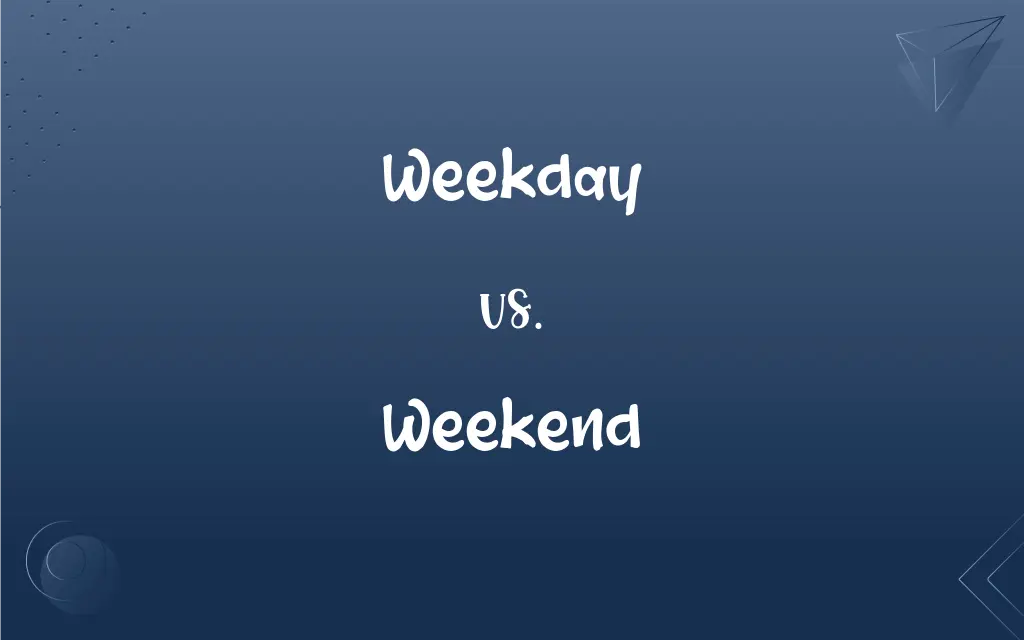Weekday vs. Weekend: What's the Difference?
Edited by Aimie Carlson || By Harlon Moss || Updated on November 11, 2023
Weekdays refer to regular working days, typically Monday to Friday, while weekends are leisure days, usually Saturday and Sunday, reserved for rest and personal activities.

Key Differences
Weekdays are generally the days of the week from Monday to Friday. These days are typically associated with work, school, and regular routines. In contrast, the weekend, which includes Saturday and Sunday, is seen as a time for relaxation, leisure activities, and a break from the regular weekday routine.
During weekdays, businesses and schools are usually open, and public transport operates on a regular schedule. This contrasts with the weekend, where many businesses and educational institutions close or have reduced hours, and public transport schedules may be limited.
Weekdays often involve a structured schedule, with set times for work or school and other responsibilities. Weekends, on the other hand, offer more flexibility, allowing individuals to engage in hobbies, spend time with family, or simply relax without the constraints of a fixed schedule.
In terms of societal rhythm, weekdays mark a period of productivity and economic activity. In contrast, weekends provide a societal pause, where cultural and recreational events are more common, reflecting a shift from professional to personal life.
The cultural significance of weekdays is often associated with responsibility and obligation, while weekends carry a connotation of freedom and choice, offering a balance between duty and leisure in weekly life.
ADVERTISEMENT
Comparison Chart
Definition
A day of the week except Saturday or Sunday
Saturday and Sunday, typically non-working
Usage in Sentences
Often used in the context of work or routine
Commonly mentioned in leisure contexts
Pluralization
Weekdays (referring to multiple days)
Weekends (multiple Saturdays and Sundays)
Associated Activities
Work, school, regular routines
Rest, leisure, personal activities
Cultural Connotation
Regularity, responsibility
Relaxation, break from routine
ADVERTISEMENT
Weekday and Weekend Definitions
Weekday
A weekday is a day that is usually not part of the weekend.
The gym is less crowded on weekdays.
Weekend
A weekend is often a break from the regular work or school week.
The office is closed on the weekend.
Weekday
Weekday denotes the part of the week typically dedicated to professional or academic activities.
Most people travel to work on weekdays.
Weekend
A weekend is the period of the week typically dedicated to rest, encompassing Saturday and Sunday.
We're planning a short trip for the weekend.
Weekday
Weekday refers to the standard working or school days.
The library is open longer hours on weekdays.
Weekend
Weekend refers to the days of the week generally reserved for leisure and personal activities.
I like to go hiking on the weekend.
Weekday
A weekday is often characterized by regular routines and obligations.
On weekdays, I usually wake up early for work.
Weekend
Weekend signifies the time for relaxation and hobbies, distinct from weekdays.
Most weddings are held on the weekend.
Weekday
A weekday is any day of the week except Saturday and Sunday.
I have a meeting scheduled on a weekday next week.
Weekend
A weekend is the concluding part of the week, usually for unwinding.
The park is particularly lively on the weekend.
Weekday
Any of the days of the week exclusive of Sunday and Saturday.
Weekend
The last part of the week, typically from Friday evening through Sunday evening, but sometimes including other adjacent days, especially when seen as a time of leisure or recreation
Spent the long weekend fishing.
Weekday
Any individual day of the week, except those which form the weekend or the single weekly day off; that is:
Weekend
To spend weekends or a weekend.
Weekday
Monday, Tuesday, Wednesday, Thursday or Friday, but not Saturday or Sunday.
Weekend
The break in the working week, usually two days including the traditional holy or sabbath day. Thus in western countries, Saturday and Sunday.
Weekday
(Islam) Saturday, Sunday, Monday, Tuesday, Wednesday, Thursday, but not Friday.
Weekend
To spend the weekend.
We'll weekend at the beach.
Weekday
Monday, Tuesday, Wednesday, Thursday, Friday, or Saturday, but not Sunday. (e.g. in Vietnam)
Weekend
Of, relating to or for the weekend.
I'm wearing my weekend shoes.
Weekday
(Judaism) Sunday, Monday, Tuesday, Wednesday, Thursday or Friday, but not Saturday.
Weekend
Occurring at the weekend.
A weekend break
Weekday
Any day of the week Monday through Sunday.
Weekend
A time period usually extending from Friday night through Sunday; more loosely defined as any period of successive days including one and only one Sunday
Weekday
Any day except Sunday (and sometimes except Saturday)
Weekend
Spend the weekend
Weekday
Occurring every day of the week except Sunday (and sometimes Saturday);
His weekday commute
A weekday newspaper
FAQs
Do all countries have the same weekends?
No, some countries have different days for weekends, like Friday and Saturday in many Middle Eastern nations.
What are weekends?
Weekends consist of Saturday and Sunday, often dedicated to leisure and rest.
Can weekdays include Saturday?
Traditionally, weekdays do not include Saturday, though some cultures or businesses might differ.
Why were weekends created?
Weekends were established to provide workers with regular rest periods and time for personal life.
Is the weekend considered a holiday?
Weekends are not official holidays but are generally days off from work for most people.
What are weekdays?
Weekdays are the days from Monday to Friday, typically associated with work or school.
Why are weekends shorter than weekdays?
Weekends are shorter to balance work and rest periods, a convention established over time.
Are there any health benefits to weekends?
Yes, weekends offer rest and recovery time, beneficial for mental and physical health.
Are weekends the same for all professions?
No, some professions, like healthcare or retail, may have different or extended weekend hours.
Do weekends have a cultural significance?
Yes, weekends often have cultural and social importance, being times for family gatherings, events, and relaxation.
Are weekdays universal?
While most places follow a Monday to Friday schedule, actual working days can vary globally.
Do businesses operate differently on weekends?
Yes, many businesses have reduced hours or are closed on weekends.
Is public transport affected on weekends?
Yes, many public transport systems operate on a reduced or different schedule during weekends.
Do weekdays affect lifestyle choices?
Yes, weekdays often dictate work, school schedules, and routine activities.
Are weekend activities different from weekday activities?
Generally, weekends are for leisure and personal pursuits, unlike the routine focus of weekdays.
Are weekends a recent invention?
The concept of weekends became more standardized with industrialization and labor movements in the 20th century.
Can people work on weekends?
Yes, many people work on weekends, especially in industries like hospitality or healthcare.
Can weekends vary within the same country?
Yes, different regions or industries within a country might observe different weekend days.
Do schools operate on weekends?
Typically, schools are closed on weekends, though there may be exceptions for special programs or events.
Is it common to travel on weekends?
Yes, many people use weekends for short trips and getaways.
About Author
Written by
Harlon MossHarlon is a seasoned quality moderator and accomplished content writer for Difference Wiki. An alumnus of the prestigious University of California, he earned his degree in Computer Science. Leveraging his academic background, Harlon brings a meticulous and informed perspective to his work, ensuring content accuracy and excellence.
Edited by
Aimie CarlsonAimie Carlson, holding a master's degree in English literature, is a fervent English language enthusiast. She lends her writing talents to Difference Wiki, a prominent website that specializes in comparisons, offering readers insightful analyses that both captivate and inform.







































































